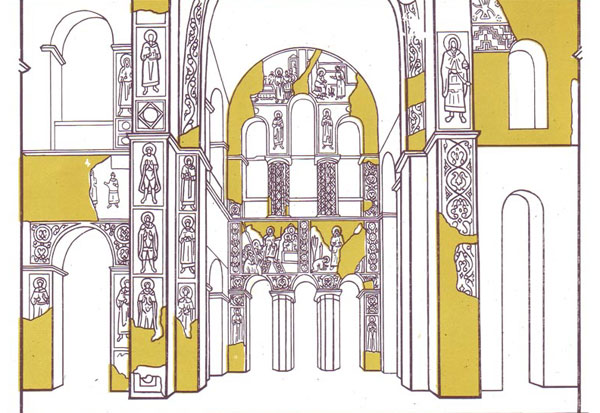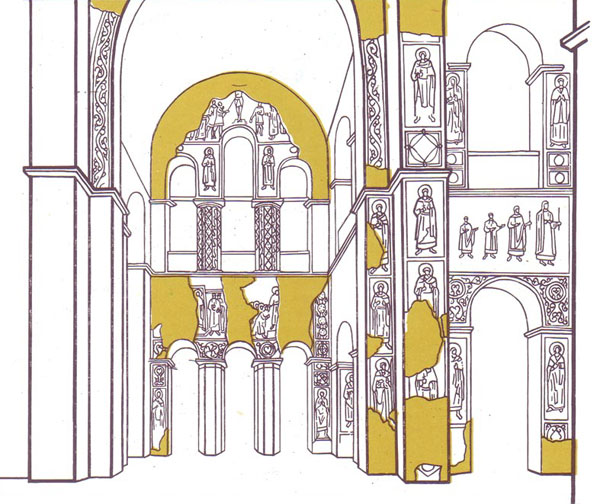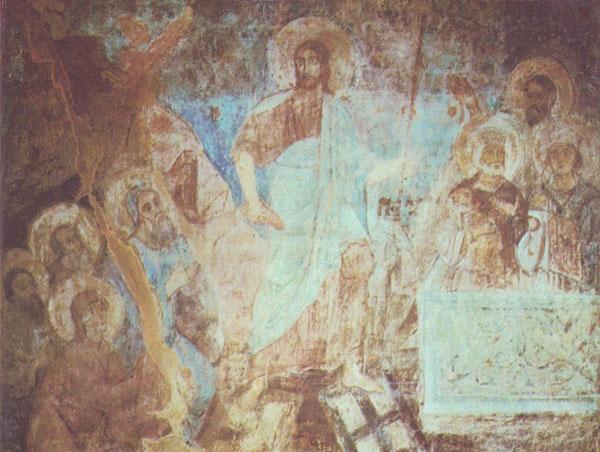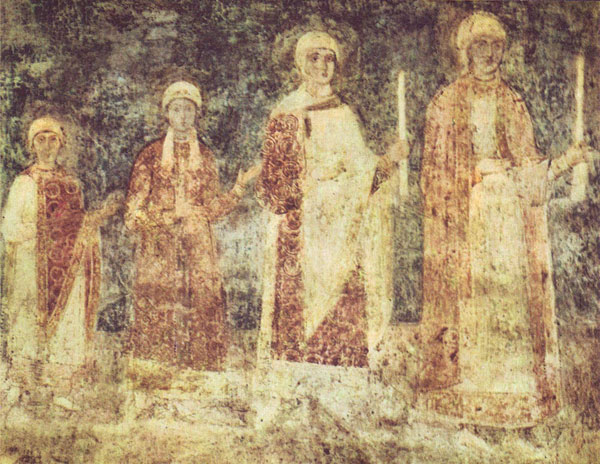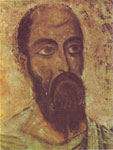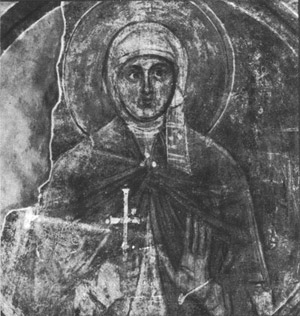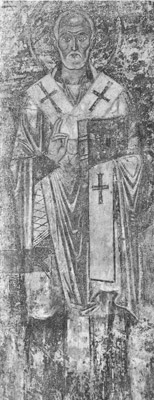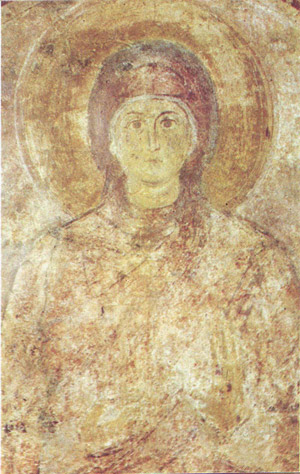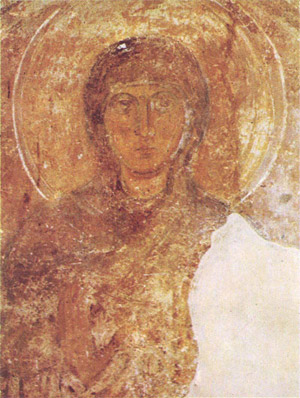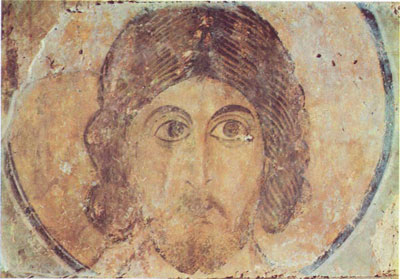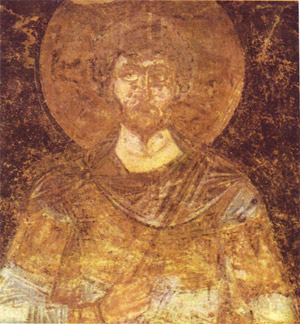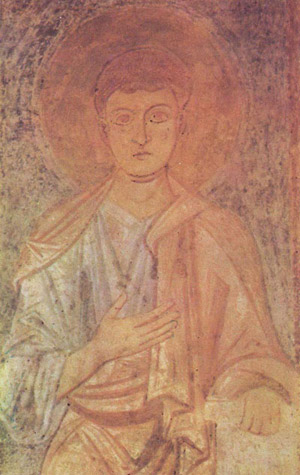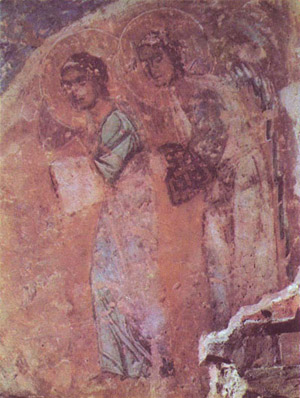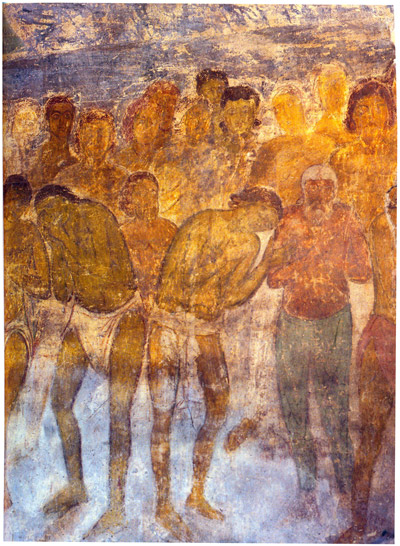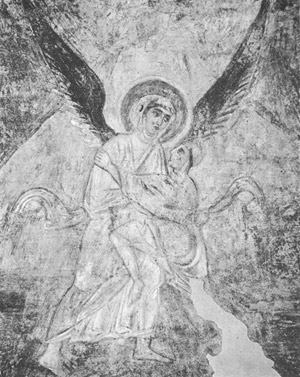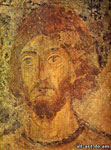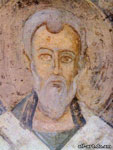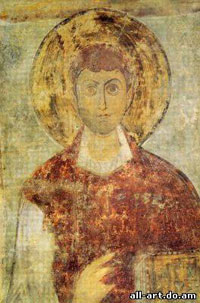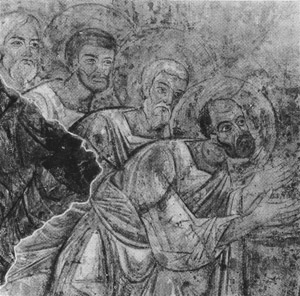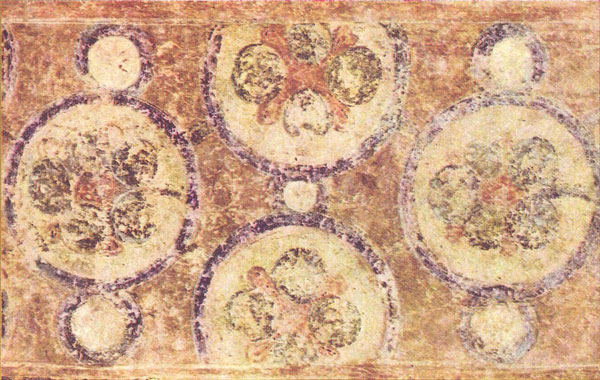ua. ru. en.
Museum ST. SOPHIA CATHEDRAL
Historical information
Plan of museum
ST. SOPHIA CATHEDRAL
Narthex
Architecture and murals
- Plan, Ground floor
- Mosaics
- Frescos
- Graffiti
- other details
Sarcophagus of Yaroslav the Wise
North cloister
Towers
Lofts
- Plan, First floor
ARCHITECTURAL MONUMENTS OF THE 18TH CENTURY
Bell Tower
Seminary
Cells of the Cathedral Elders
Metropolitan's Residence
Refectory
Consistory
South Entrance Tower
Zaborovsky Gate
First Rus library
BRANCHES OF THE MUSEUM
|
|
Excursions Kiev
weekend in Kiev
trip to Kiev
Excursions
tours to Kiev
Sights of Kiev
FRESCOS
Frescos, in early times, covered all the lateral walls of the building, as well as those in the lofts and towers. When repairs were made in the 17th century, the original paintings were partly renovated with size colours. At the turn of the 18th century, the ancient frescos, damaged at the time, were even plastered over and covered with whitewash. In the 18th century, new paintings which met contemporary demands were painted in oils on top of the originals. In the mid-19th century, the frescos under the 18th-century paintings were cleared of the overpainting and again covered with oil paintings which, however, were of no artistic value though the subjects were imitations of old iconography.
Transept. North section. Diagram of frescos arrangement:
Transept. South section. Diagram of frescos arrangement:
During the years spent on modern restoration work in the St. Sophia Cathedral, the 11th-century frescos were cleared of the later overpaintings and the exfoliated parts were re-placed. Where the original frescos were lost beyond recall, the paintings of a later date were preserved in order to maintain the unity of the entire mural complex. In some places 17th- and 18th-century compositions were retained.
fresco Christ's Descent into Hell. Transept. North section:
Christ's Descent into Hell. Prophets. Detail
Descent of the Holy Ghost. Detail. Transept. South section:
The scheme of fresco paintings included large group-scenes, both full- and half-figure images of saints, as well as numerous ornamentations.
In the space below the central cupola were placed large group compositions of scenes from the Gospel which depicted the deeds and the martyrdom of Christ, and stories of the spreading of the Christian faith. Originally, these compositions were arranged chronologically in three tiers running from left to right.
The first scenes of the cycle were painted on the vaults of the transept and in the western part of the nave. However, none of the frescos of the upper tier have survived to our times. The scenes of the middle tier were painted over the vaults of the triple-arched arcades, and begin at the northern part of the transept with two compositions: Peter's Denial of Christ and Christ Before Caiaphas. Further, the story is picked up in the southern part of the transept with the painting of the Crucifixion.
The frescos of the lower tier are placed above the octagonal columns of the transept. The north wall preserves the scenes The Descent of Christ into Hell and Christ Appears to the Women Bearing Spices; and the south wall The Doubting of Thomas and Sending the Disciples Forth to Preach. On the wall adjoining the latter picture is the concluding scene of the Gospel cycle The Descent of the Holy Ghost.
Of special value among the St. Sophia frescos is the group portrait of the family of Yaroslav the Wise. The composition had been placed on the north, west and south walls of the nave. As for the central part of the composition, originally on the west wall but which has not survived, its existence is known only from the sketch made by Abraham van Westerveldt in 1651. His sketch shows Yaroslav the Wise holding a model of St. Sophia Cathedral in his hand and Yaroslav's wife, the Princess Irene. They make for the figure of Christ near whom, in all probability, stood Prince Vladimir and Olga - the founders of Christianity in Old Rus. Behind Yaroslav and Irene, their sons and daughters form a solemn procession. From these portrayals, only four figures survive on the south wall of the nave, and two on the north.
Portrait of family of Yaroslav the Wise. Details. Nave:
Portrait of family of Yaroslav the Wise. Theoretical reconstruction:
1. According to V. Lazarev: on the left of Christ-Princess Irene with daughters, on the right-Yaroslav the Wise with sons
2. According to S. Vysotsky: on Christ's left - Prince Vladimir and Prince Yaroslav with sons, on his right - Princess Olga and Princess Irene with daughters
3. According to A. Poppe: on the left of Christ - Prince Yaroslav with sons and a daughter, on the right - Princess Irene with daughters
The fresco suffered much damage during the restoration work made in the 19th century. Oil paintings were applied over the frescos: the full-length portraits of great martyrs on the south wall and saints on the north wall. The cleaning and restoration of these frescos took place in 1934-1935 after St. Sophia had become a state-preserved museum. Besides the frescos, on the north wall one can see three figures painted in the 18th century and the head of a saint made in the 19th century.
The poor condition of this fresco composition and the absence of the original inscriptions makes it difficult to reconstruct the scenes or to determine the personages of the surviving figures. However, the four figures on the south wall are widely known as portraits of Yaroslav's daughters, though a scholarly hypothesis exists that defines them as male figures (in particular, the first two figures holding candles). The family portrait of Yaroslav the Wise in the centre of the cathedral served as confirmation of the princely autocracy. And now, looking at the figures in the portrait, we are reminded of the ties contracted between the princely house of Kiev and the largest states in Europe. Irene, the wife of Yaroslav the Wise, was a Swedish princess; Yaroslav's sons - Svyatoslav and Vsevolod - were married to Greek princesses; his daughters - Elizabeth, Anna and Anastasia - were queens of Norway, France and Hungary, respectively. The portrait of the family of Yaroslav the Wise is an Old Rus relic of monumental portrait painting.
The other murals on the ground floor of St. Sophia are religious in content. The frescos in the Chapel of Joachim and Anna relate the story of the Virgin Mary and her parents; the frescos in the Chapel of SS. Peter and Paul tell of the Acts of the Apostle Peter.
The frescos in the south apse called St. Michael's Chapel are devoted to the Archangel Michael, who was regarded as the patron saint of Kiev and of the Prince's armed retainers (druzhina). The chapel features a monumental half-figure of the Archangel Michael with figures of the Church Fathers below. The vault before the chapel apse bears a picture of Jacob Wrestling with the Archangel (on the north intrados) and The Outcasting of Satan (on the south intrados). The arch in the aisle before the chapel contains several compositions: The Manifestation of the Archangel Michael to Zachariah, and The Manifestation of the Archangel Michael to Balaam (north intrados); also The Manifestation of the Archangel Michael to Joshua (south intrados). There still survives a blocked-in window surround that dates to the 11th century in the south wall of the apse of St. Michael's Chapel. Beneath it is an 18th-century composition The Miracle of the Archangel Michael at Coniah.
The Apostle Paul. Detail. St. Peter and St. Paul's Chapel:
The Apostle Peter. Detail. St. Peter and St. Paul's Chapel:
Scene from The Life of St. Peter. Boy's head. Detail. St. Peter and St. Paul's Chapel:
The Warrior. Nave. South-west column below the cupola:
The north chapel is dedicated to St. George, the patron saint of Prince Yaroslav the Wise (his Christian name was George). A half-figure of St. George is painted on the upper half of the arching apse, with the Church Fathers depicted below. On the vault before the apse one finds scenes from the Life of St. George. Only some details of these compositions survive, in particular from The Inquisition of St. George, The Torment of St. George in the Pit of Lime and others. On the north wall to the left of the passage leading to the former cloister, there survives a fresco depicting a man in rich dress with rarsed arms. It is thought to be part of a large composition Yaroslav the Wise Before St. George (not pre-ved), and that the image is that of Grand Prince Yaroslav.
The drawings of the male heads attract one's attention in St. George's Chapel. They are situated on the left of the figure of St. George, and executed as graffito drawings on the plaster background. It was apparently done during the restoration work carried out in the 19th century.
Anonymous saint. St. George's Chapel:
Saint. St. George's Chapel. 11th-century fresco:
St. Barbara. Detail. Nave. North-west cruciform column:
The Prophet. 11th-century fresco. St. George's Chapel:
St. Nicholas. 11th-century fresco. Nave:
Saint. 11th-century fresco. Nave:
Anonymous saint. St. George's Chapel:
St. Nadiya. St. George's Chapel:
Manifestation of the Archangel Michael to Balaam. Detail. St. Michael's Chapel:
Anonymous saint South inner gallery:
St. Thocus. South inner gallery:
St. Philippolus. South outer gallery (western section):
St. Eudoxya. West inner gallery:
St. Theodore the Stratilate. Detail. North inner gallery:
Anonymous saint. St. George's Chapel:
An important place in the cathedral's fresco design is occupied by statue-like figures of sacred personages such as the holy martyrs, Church Fathers, apostles, canonized warriors, etc. And in the west section of the cathedral which was set aside for women during the services, such frescos usually represented "saintly wives" such as St. Barbara, St. Juliana, St. Christina, St. Catherine, etc. However, among the most vividly depicted women are the four figures set in medallions on the west side of St. George's Chapel.
To our regret, most of the frescos have not retained their original bright colours. The backgrounds were blue and the prevailing colours - dark, red, ochre, white and olive green. The artists paid special attention to painting the face, thus creating a remarkable gallery of images having their own individual traits. One is particularly drawn to the portrayal of the Apostle Peter (Chapel of St. Peter and St. Paul), of St. Barbara (west arm of the transept, of St. Thocus (south inner gallery), St. Theodore (north inner gallery) and many others.
The Baptism. Detail. Baptistry:
The Forty Martyrs of Sebaste. Details. Baptistry:
Both the mosaics and frescos in the cathedral are closely bound to the interior architecture. They harmonize with its forms from the ornamental aspect and through the language of their art and expressive depth of their images.
Emperor Constantine. 11th-century fresco. St. Michael's Chapel:
Emperor Justinian. 11th-century fresco. Joachim and Anna's Chapel:
Mary Receiving the Purple and Cochineal. 11th-century fresco. Joachim and Anna's Chapel:
Jacob Wrestling With the Archangel Michael. 11th-century fresco. St. Michael's Chapel:
Figure of Prince (?). 11th-century fresco. St. George's Chapel:
Fresco Archangel:
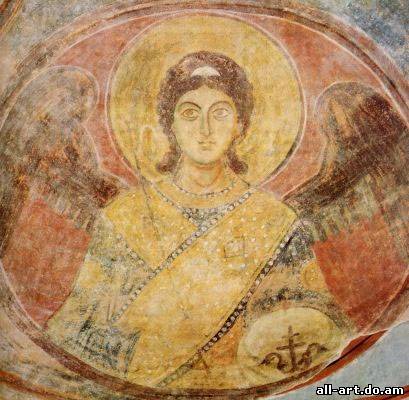
Fresco St. George Detail:
Fresco Annunciation. Archangel Gabriel. Detail:

Fresco Kissing Mary and Elizabeth Detail:
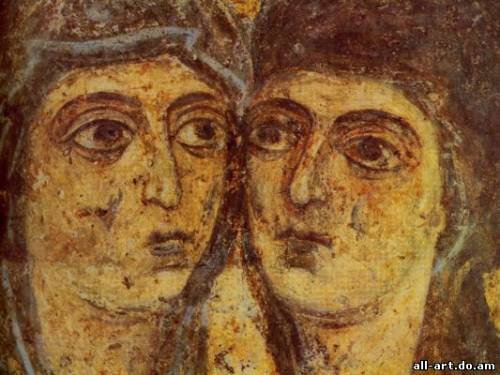
Fresco Assurances Thomas. Christ and the Apostles. Detail:

Fresco Saints. The left side:
Fresco unknown Saint:
Fresco St. Pankrat³y Detail:
Fresco Grigor³y Theologian:
Fresco unknown Saint:
Fresco St. Ermilos:
Fresco St. Viktor:
Fresco St. Mel³ton:
Fresco ²oann Baptist:
Fresco unknown Saint:
Fresco griffin. Detail:

Details of frescos:
Like the mosaic artisans, the names of the painters are also anonymous. Only in the apse of St. Michael's Chapel can one decipher the name "George" written in Greek on the wet plaster before the colour layer was applied. Possibly it is the name of a painter who once worked on the frescos.
A great role in the mural arrangement is played by the ornamentation which richly enhances the beauty and richness of the cathedral's inner decor.
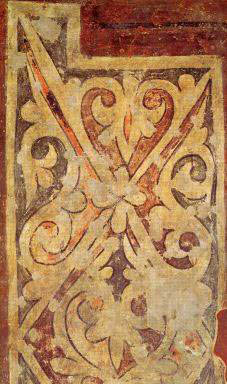
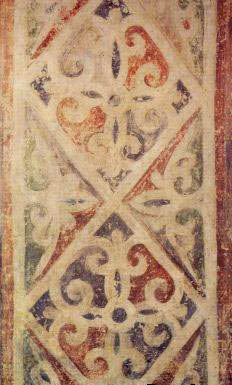
Read more:
- Frescos in the North outer cloister >>>
- Frescos in the towers St. Sophia Cathedral >>>
- Frescos on the First floor of St. Sophia Cathedral (LOFTS) >>>
- MOSAICS >>>
- GRAFFITI >>>
- Other Details of the interior of the St. Sophia Cathedral >>>
 Mosaics and frescoes of St. Sophia Cathedral IN KIEV
Mosaics and frescoes of St. Sophia Cathedral IN KIEV
Virtual tour around the museum’s grounds of Saint Sophia Cathedral
National Historical Reserve "St. Sophia Cathedral in Kiev"
Address: Vladimirskaya Str. 24, Kiev Ukraine
Underground station "Golden Gate".
Hours: 10:00 - 17.30
Closed: Thursday
